The slow transition from ‘almost all about Covid’ to ‘only somewhat about Covid’ continues, with the non-Covid various-things-to-note portion this week reaching something like 25%. My presumption is that this portion will continue rising over time.
What’s happening with Covid? More of the same old stuff, basically, and nothing that it is vital to know short term.
The quiet news is that Biden intends to elevate ASPR to coordinate pandemic response rather than the CDC or FDA. My hunch is this will only make things that much more convoluted and worse.
This week’s other post is a fun little trifle called YouTubeTV and Spoilers. Various more substantial things in the works but all in good time.
Executive Summary
ASPR to coordinate future pandemic response.
FDA to evaluate itself a little, but not with respect to pandemic.
ACX offers criticism of criticism of criticism, good show all around.
Let's run the numbers.
The Numbers
Predictions
Prediction from last week: 750k cases (+1%) and 2,450 deaths (-15%).
Results: 770k cases (+4%) and 2,453 deaths (-15%).
Prediction for next week: 780k cases (+1%) and 2,450 deaths (+0%).
It is very hot. I expect people to stay home a bit, so although BA.5 has probably not yet peaked I am guessing we will get a quiet week. Deaths shouldn’t move much either, so the null prediction seems fine.
Deaths
Almost exactly on target as the West falls back to previous levels.
Cases
Gradual increase across the board as BA.5 fully takes over.
Physical World Modeling
Post pointing out that scientists don’t know what variants will emerge. I was not aware that we thought that anyone might know this?
BA.5 at 78% of cases, so transition is mostly complete.
Mina points out we should be trialing various potential vaccine options. Well, yes.
Chance of reporting Long Covid after 12-16 weeks given you also are reporting Covid around 4%. Seems broadly compatible with previous estimates.
Perhaps the reason there is are economic problems is… Covid? As in, maybe when lots of people are sick that could be bad? The basic premise that a bunch more sick people is going to be an issue is definitely underappreciated. Yet it can be taken too far. At what point does it become ‘misinformation’? What determines which things are and aren’t under that heading?
It continues, and builds up into clear misinformation and to an absurd call to have Done More, but that’s where he loses me. You can’t generalize from one friend, that’s not how any of this works. A 14-day cycle and 1 million infections per day all of which knock someone out for two weeks doesn’t jive. Is it reasonable to claim there are actually a million infections per day? They would need to mostly be mild, unnoticed reinfections, but yes, that is a possible world.
The thing is, if they’re mostly mild unnoticed reinfections, then they’re mostly not going to knock people out at all, let alone for 14 days. This is often the two-step, where you estimate the true number of cases, but then multiply that by the expected effects of measured cases, and you absolutely cannot do that.
There’s also the Long Covid two-step, where one asserts lots of chronic fatigue and then tries to do numbers without it. I strongly agree that if there was tons of Long Covid causing lots of people to be unproductive that would do a lot of economic damage.
It is exactly the lack of sufficient damage there that makes me confident it isn’t happening. The traditional explanations may not fully explain what is missing, but they are not obviously inadequate to the task. We are doing a fine job screwing things up in straightforward ways.
So why where does the misinformation label start, and where should it start? In practice, it depends on whether something supports the narrative and/or current thing (at least with respect to Covid, now that the true Current Thing has moved on).
FDA Delenda Est
Interesting things to hear the head of the FDA say.
It would be rather odd if the FDA hadn’t taken many significant actions that benefit the public health, if only by agreeing to stop preventing people from benefiting public health. That’s the core job of the FDA, to stop people from benefiting public health and then to take credit for when they are persuaded to unblock something specific.
They have also ‘confronted challenges that have tested our regulatory frameworks,’ presumably things like ‘our framework is designed to stop people from having access to baby formula or monkeypox vaccinations or safer alternatives to smoking.’ Stuff like that.
It certainly seems better to order a comprehensive evaluation than not do so. And indeed, those regulatory challenges are indeed to the food supply and tobacco product areas, because everything else is going fine.
As a result, for two of the agency’s key programs, I have commissioned external agency experts to conduct a comprehensive evaluation for:
The agency’s Human Foods Program, including the Office of Food Response and Policy (OFPR), Center for Food Safety and Applied Nutrition (CFSAN), as well as relevant parts of the Office of Regulatory Affairs (ORA)
While America’s food supply is safe, and our Foods program experts have significantly contributed to the availability of more nutritious food options for consumers, the program has been stressed by the increasing diversity and complexity of the nation’s food systems and supply chain. Fundamental questions about the structure, function, funding and leadership need to be addressed. The agency’s inspectional activities related to the program also need to be evaluated, particularly in light of stresses related to the COVID-19 pandemic.
As usual, ‘the FDA has contributed to X’ presumably means ‘the FDA reduced the severity with which it is restricting and banning X’ or sometimes it means ‘we are banning Y thus forcing people to use X, yay.’ The program is ‘stressed by the increasing diversity and complexity of the nation’s food supply chain’ in the sense that if you go around having to unban each specific thing then complexity is going to be a problem for you, especially if you don’t do it.
The Center for Tobacco Products (CTP)
Just over 13 years ago, Congress tasked the FDA with regulating tobacco products. In the ensuing years, we have made important progress and reached regulatory decisions on a broad array of millions of products. But even greater challenges lie ahead as we determine how the agency will navigate complex policy issues and determine enforcement activities for an increasing number of novel products that could potentially have significant consequences for public health. CTP will continue its important work during the evaluation, including review pending applications and take enforcement actions as needed.
Why is the FDA navigating complex policy issues regarding tobacco products? Why are there even such issues? And don’t we have the ATF? It seems to me like the ‘complex issue’ is that the FDA is trying to ban things that it thinks it can get away with banning, forcing people underground or forcing them to use worse things, and then it turned out people didn’t like that.
And no, there will be no review of the FDA procedures that massively messed up the pandemic. Those parts are fine. The issue is the food supply.
You see, when you mess up the food supply or tell people they can’t vape, people notice.
Especially when there is still no timetable for ending the formula shortage.
It turns out that ‘use a plane to fly in some formula’ is not a substitute for ‘allow the market to supply people with formula.’
Who knew? Well, basically everyone at this point. And they call it something like this.
Amount the agency gets it? Zero:
"We have the safest food in the world," Califf said in a Congressional hearing Wednesday. "Every expert I've talked with—the CDC monitors this carefully—said that our food is as safe as it's ever been. …That doesn't mean it can't be a lot better and that there aren't major problems. So, you know, that's why we're doing this top-down review and plan to make significant changes."
The issue is not that the American food supply is not ‘safe’, in the sense that the food is not contaminated or poisoned. The issue is that the food supply is not ‘safe’ in the sense that people are not ‘safe’ to supply us with the food, including when ‘us’ means babies, which is happening in the name of safety. If you have ‘the safest food in the world’ that isn’t a sign you are doing everything right. It is a sign you are taking things way too far, even if you are doing it in a reasonable way, which the FDA most definitely isn’t doing.
America, of course, doesn’t have the safest food supply in the world, in the sense that our food supply contains lots of things that are bad for you, many of which (as in ‘sugar’ and ‘corn syrup’ writ large) are industries that are getting heavy government subsidies.
That’ll Fix It
The FDA might not recognize that the pandemic response wasn’t great, but the Biden Administration does, and their solution is to elevate a department of the HHS to coordinate the response next time?
The Biden administration is reorganizing the federal health department to create an independent division that would lead the nation’s pandemic response, amid frustrations with the Centers for Disease Control and Prevention.
The move elevates a roughly 1,000-person team — known as the Office of the Assistant Secretary for Preparedness and Response, or ASPR — into a separate division, charged with coordinating the nation’s response to health emergencies, according to seven people briefed on the plan who spoke on the condition of anonymity because they were not authorized to comment.
The reorganization allows the division “to mobilize a coordinated national response more quickly and stably during future disasters and emergencies while equipping us with greater hiring and contracting capabilities,” Dawn O’Connell, who leads ASPR and would run the new division, wrote to staff members Wednesday afternoon. The emailed memo was shared with The Washington Post.
The article does not give any hope that the ASPR is the hero we need, whether or not it is the hero we deserve.
In addition to its pandemic work, ASPR has helped coordinate Operation Fly Formula, an effort to quickly import baby formula from overseas to address U.S. shortages.
Great work, everyone? So, how do you think this plays out?
ASPR was founded in 2006, in the wake of Hurricane Katrina and other disasters that taxed the nation’s emergency response. But the office, which operates out of the federal health department’s headquarters in D.C., has frequently come into conflict with the much larger CDC, which is based in Atlanta, employs about 13,000 people and has historically led the response to disease outbreaks, including covid-19.
…
“This is a strategic mistake and will create more confusion, indecision, and delays in responding to pandemic crises,” said Scott Gottlieb, who served as commissioner of the Food and Drug Administration during the Trump administration and has advised both the Trump and Biden administrations on their coronavirus response. “CDC possesses all the tools of response, and has the expertise. Ultimately, CDC needs to own this, and if they can’t execute well, that needs to be fixed.”
Scott also says flat out that ASPR did not exactly cover itself in glory during the pandemic.
I do not agree that the CDC has the tools of response, because it can’t stop the FDA from making things worse. I do not agree that it has the expertise, because I’ve seen its work and also because it doesn’t understand that it should stop making things worse.
What I expect to happen now is instead of two agencies fighting over turf while telling Americans they can’t do useful things without their explicit approval and thus making things worse, we will have three. That does not seem like an improvement.
Court Versus Court
Some parents sue to force everyone to mask. Others sue to stop forcing everyone to mask. Some courts say remote learning is a valid alternative that is fine to force on children, others say it’s not fine.
It’s so exhausting that this all increasingly comes down to lawsuits rather than the legislature, and that the courts put the needs of the many behind the needs of the litigious few.
I strongly endorse the core logic here. Either virtual learning is torturous and awful and completely unacceptable (ding!) or it isn’t. There is no solution that everyone is going to feel is acceptable to everyone all the time. But then, there never was. That’s what school is about. It’s about those with the power deciding to exert minute control over every detail of your child’s life, often in ways they find humiliating and stressful, under threat of horrible things happening to them if it isn’t tolerated and all the hoops are not jumped through.
Your child ‘doesn’t feel comfortable’ with some crazy arbitrary stupid requirement of the school so they think it should go away? Oh boy do I have news for you.
Meanwhile Washington, DC mandates the Covid vaccine for school children ages 12 and up for the coming year, which right now would exclude one child in five. Somehow I do not expect this to go well or quietly.
In Other News
Novavax vaccine makes it through, will be available for those 18+.
Long thread (you will want to scroll to the top) focusing on the situation in Hong Kong.
There is only so much you can do via stringency of isolation. Some amount of isolation decreases spread at the expense of more isolation. As it gets stronger, the increased isolation of effected cases has smaller marginal impact on spread from that case, and it causes more distortionary effects.
In particular, if the official guidelines are too strict, you’re giving people strong incentive to not officially test positive. Should it be 5 versus 10 days? That’s a tradeoff. A full 24 days? That’s well above the peak.
I would be shocked if a third or more of cases were being found, because of how much pressure is being put upon everyone to not find them.
Exactly. Consider that places like NYC or London are lucky to identify one case in ten.
Bracelets are telling people they won’t have the option to disobey the law in an emergency situation, or when it makes sense, once they reveal they are positive. The implications are obvious.
Then the thread takes a sharp turn as others discuss how much we know about the virus. For that section, I think it’s right to say that at this point we don’t know that much for sure but that we know quite a lot with reasonably high confidence.
New York City may implement air quality standards.
Levine first announced his proposal at a recent CityLaw breakfast hosted by New York Law School. “[We] are beginning a major push that I think will be critical to protecting us long-term from this virus, from future waves, and similar transmissible diseases, which is we want to have high standards on air quality in buildings in New York City, something that we simply don't have now, that we've never really adequately addressed,” he said. “We're preparing legislation that we hope will make this analogous to fire safety provisions but of course focused on things like air flow and filtration in public buildings, commercial buildings, even residential buildings.”
…
Levine’s bill is still being crafted but he hopes to apply the standards both to new construction and also existing buildings. “It's the kind of long-term work that we should be doing now because we could have future, serious waves of Covid and because there could be other airborne pathogens which we want to protect against,” he said.
Oh no.
Air quality, ventilation and filtration is important. It is important to pandemics, and it is important to ordinary life.
Still. Oh, no. We all know that in practice what fires codes are for is to make the homes of poor people illegal, and to put a bunch of additional burdens on having places to exist. They are additional friction on everything, and now we are going to do this for air ventilation? So basically this becomes an excuse to ban a whole bunch of housing, and a whole bunch of businesses, out of existence. Hopefully it won’t come to that in practice.
The idea of ‘we want X so we are going to ban any Y without X’ is mostly a way to make sure Y is supply limited and expensive and that poor people can’t have Y. Here, Y is ‘indoor space.’
Thread about legal efforts to limit the powers of public health authorities. It turns out that if authorities do things that people do not want them to do, and that cause a lot of disruption for not much benefit, those people will sometimes look to find ways to stop them from doing those things. And yes, that will make it tougher to use such powers when they would do more good, but is also evidence that the system was going to use them way too often. Wolf.
Not Covid
Scott sees my inevitable Criticism of EA Criticism Contest and without missing a beat raises Criticism of Criticism of Criticism. Can’t be mad at anything with that name. It’s fun, you should read it. I probably won’t be raising at post level to Criticism^4, and it seems like both of us broadly agree that the thing being pointed to, where criticism is asked for but only the right kind of criticism that mostly affirms the status quo and tells a story of seeking criticism, while claiming to want core critiques, is Standard Procedure rather than a problem unique to EA. What confuses me is his confusion about why I went into detail, and also why he thinks I wasn’t making this point (while also, of course, making other points). Or why he thinks it being inevitable makes its existence suspicious, rather than usually justified or appropriate.
Magnus Carlson will not defend his title as Chess World Champion, and didn’t have any conditions under which he would have done so. I get that he feels he’s been there, done that and has better things to do, but no, he doesn’t, and he is making a mistake. The World Championship, of anything, is different. If chess is to be all it can be, it can’t have the best player in the world bow out of the World Championship, such that everyone basically knows the title is bogus. It’s not, as they say, good for the game, and it makes me sad.
Thread about people who oppose optimization.
On that note, Congress is poised to impose Jones Act style requirements on offshore wind by sticking it in a must-pass bill, also known as the Ban Offshore Wind Securing Energy Restrictions (BOWSER) Act of 2022. You know democrats are serious about climate and are treating it as a threat to all civilization when they impose restrictions that cripple the offshore wind industry.
File under complete absurdity of our government: House drops a STEM green card exception because the measure would ‘cost $1 billion over 10 years.’ It was proposed to pay for this by letting every PhD that is thus let into the country pay a $7,500 to cover the cost, but no, that violated Clause 5(a) of Rule 21 of the rules of the House of Representatives and we have the PAYGO rule that everything has to pay for itself. You see, that would be a tax, and we can’t consider a tax during the consideration of a bill, so we can’t consider the bill. QED.
So instead, of course, those effected are filing a lawsuit, because if the courts force us to spend the money, then that’s fine, presumably.
Obviously the CBO’s calculation here is wrong, the measure does not cost money, it makes money because such folks will end up paying back in far more than $7,500 a head over 10 years plus they’ll contribute to productivity which generates revenue. Also, the house rule is wrong, that’s not a tax, that’s a user fee. It’s not a tax to offer service X in exchange for payment Y.
There has to be a way around this craziness, we have a lot of smart people who geek out over this stuff. I have a proposal to start off with, this is brainstorming, there are no bad ideas, I’m not saying this would work I’m simply trying to get the creative juices flowing.
It’s called the Fund Unfortunately Designated Government Enterprises (FUDGE) Act of 2022.
Which raises the income tax by $100 billion over ten years.
Then as a tribute to Keynes it uses that money to pay people to dig a hole and then fill it up again during year 10, so it’s budget neutral.
When we want to increase funding for something, we cut the hole digging budget by the same amount.
Every so often you move the hole digging forward in time and you top off the fund.
It’s now like the debt ceiling, a technical legal requirement and true abomination that lets the most powerful government in the world actually walk into a Starbucks and buy three iced lattes.
I mean obviously that is terrible, what is the world coming to that I am even in jest writing those words, but the idea of ‘we have to pay for everything as we go so we are going to exactly spend every dollar at all times and then find some new gimmick every time we do anything’ is so obviously absurd for small amounts like this.
That feeling when what prevents them from doing so is your expectation that this would result in them not being into it.
Scam scammers scam scammers by impersonating the scammers to scam people.
Full Vice article is here. Psychics build up their followings and reputations, then others pretending to be them steal that reputation to extract money from their followers in exchange for fraudulent fraudulent services.
On a recent evening, the author, podcast host, and tarot reader Michelle Tea was lying in bed, reading a book. She asked her husband, scrolling his phone next to her, what he was doing.
“Talking to someone pretending to be you,” he said, casually.
All these psychics and none of them saw it coming.
“I wasn’t trying to bust them,” Tea said. “I just wanted to hear what they had to say about what they were doing, what their relationship is to the mystic arts, and how they justify what they’re doing.”
Same to you, Tea. Same to you.
At the same time, Tea said, psychic workers are often met with a distinct lack of sympathy when they talk about being the victims of fraud or impersonation. “There is a portion of the population who thinks our work isn’t real,” she said.
Let me clear up this misconception. It’s definitely real. Scams are hard work.
But even then, she feels that people should be sympathetic to the issue of paying someone under false pretenses: “It’s not what you paid for. It’s just unethical, period. People should at least recognize that.”
The people demand that they be scammed professionally, by experts that they paid to get the best scam work possible. I agree.
“I’m not without compassion or empathy for the people pulling these scams,” Tea said. “I understand capitalism puts people in desperate and stupid places and people try to get over however they can. This person has convinced themselves it’s OK.” Ironically, some of them seem to be creating more work for themselves, Tea said; one person progressed from simply taking targets’ money “to actually giving readings.”
A scammed client, Tea added, later told her, “I feel bad. The scammer gave me a good reading.”
Scamming someone by promising to scam them and not scamming them is rather low behavior. The least you can do is scam them.
Truckers protesting California’s BA.5 shut down port of Oakland. In general if the people you are trying to ‘help’ are shutting down ports in protest it is not a great sign. The protests seem to be growing and might last for months? The practical implications would rapidly become rather stark.
If you’re not sure which one I am, remember that I linked to this.
Monkeypox continues to double each week.
It is difficult to stop such a thing when you are determined to do actual nothing about it, tie vaccination requests up in paperwork of up to 100 pages while having a tentative relationship to potential supply (although it looks like the shipment from Denmark is happening on schedule after all, in the end, and it’s worth knowing that), and spending half your messaging saying that ‘this effects everyone and isn’t a disease of X’ where X is a tiny subgroup that has over 99% of the cases. I would have chosen a different strategy.
Meanwhile we have the usual freaking out from the usual suspects about how this is coming for your toddler. It isn’t. But we went through this with Covid and it’s not like anyone listened.
To those who say ‘the window is closing’ to prevent monkeypox from becoming endemic, I have some bad news. There was never a window. Either conditions were such that we would always win, or we would lose. We have no ability to do things that turn a loss into a win.
Justin Amash’s list of who in Congress was good on liberty (as in, who were in favor of it), based purely on how they actually voted, some actual percentages here.




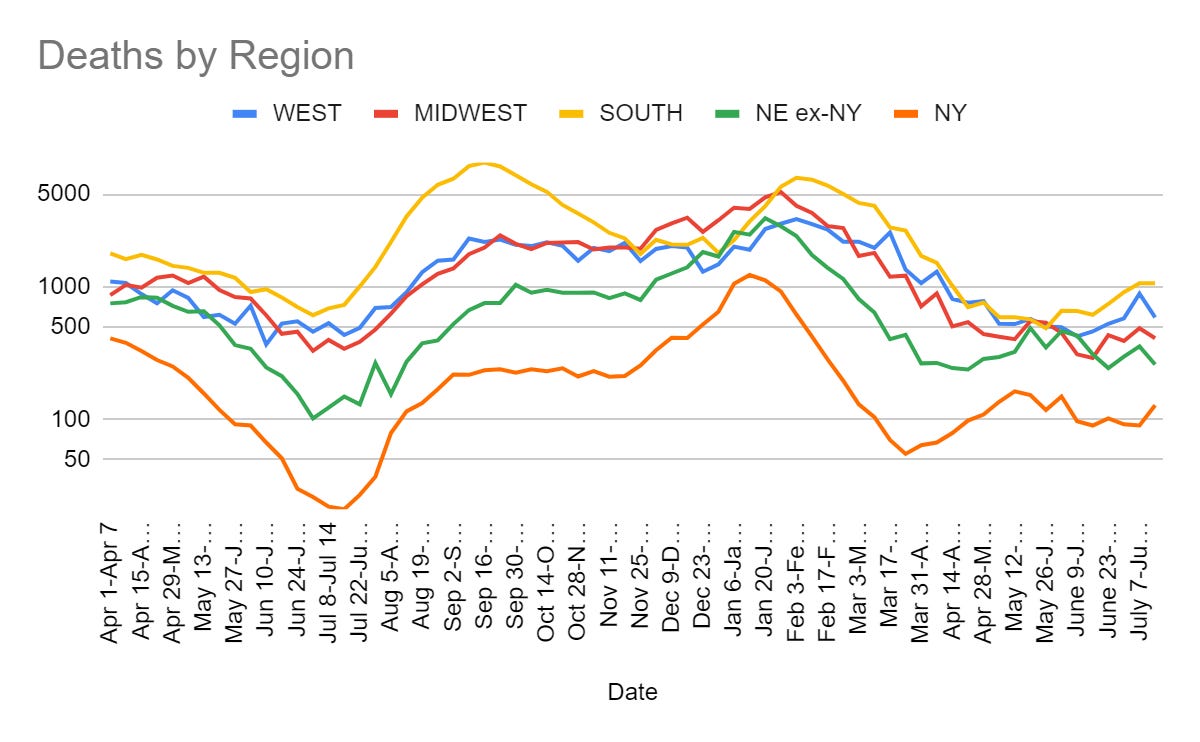
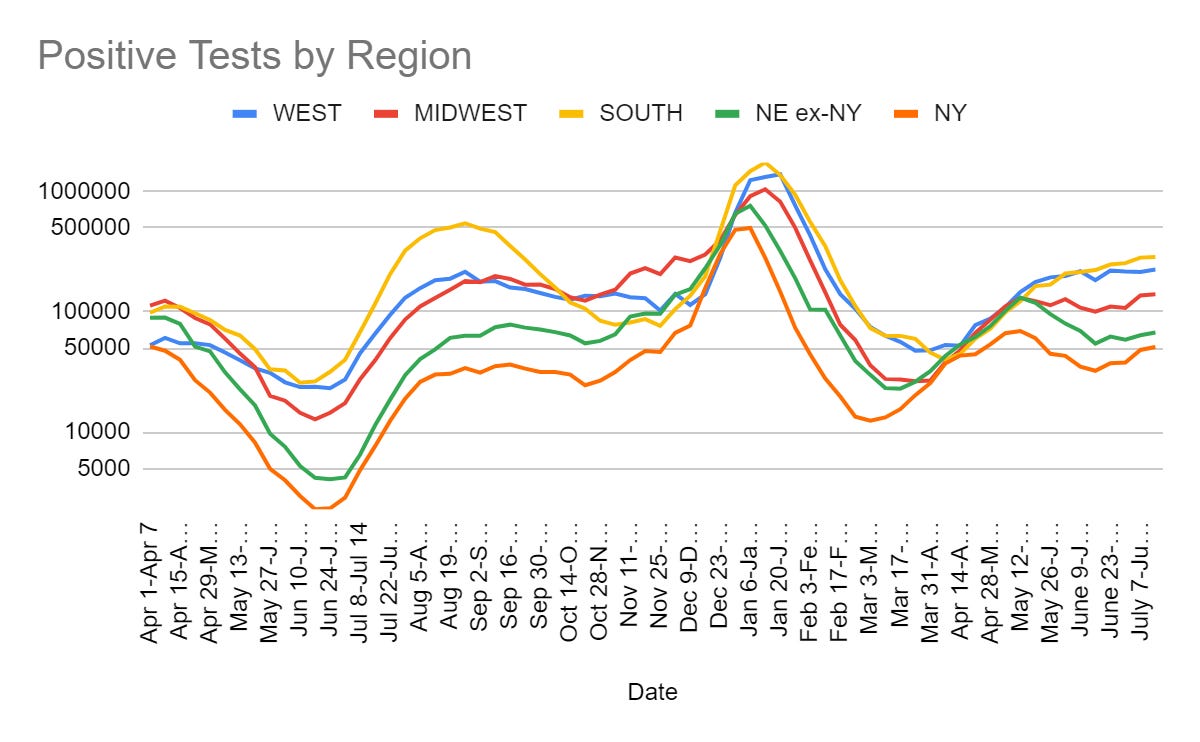

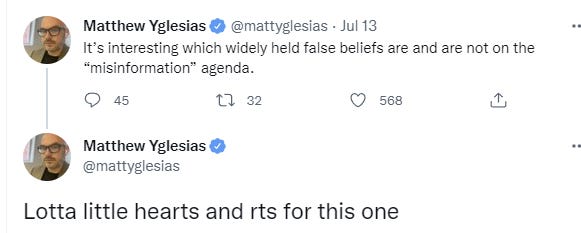
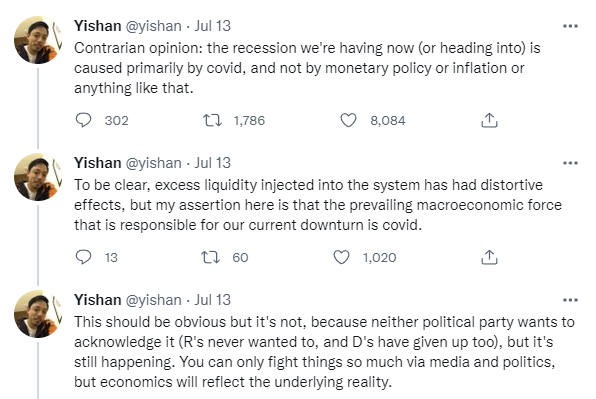

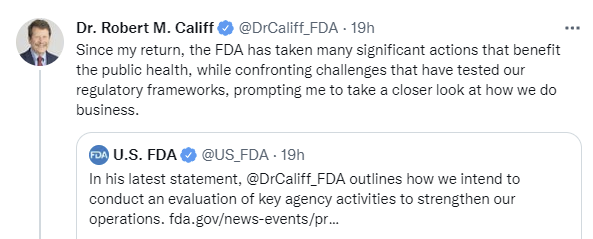
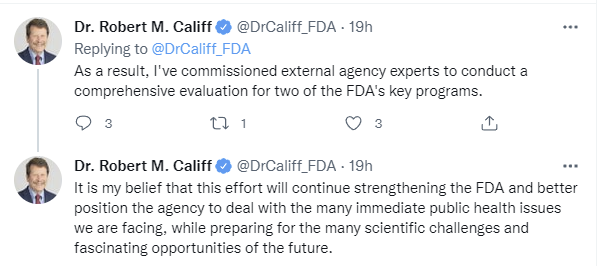
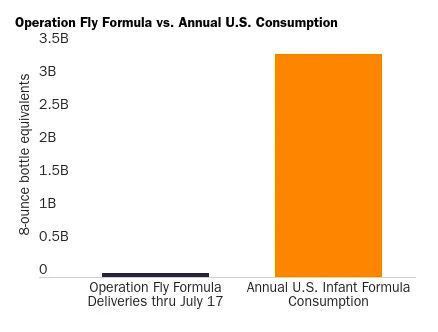

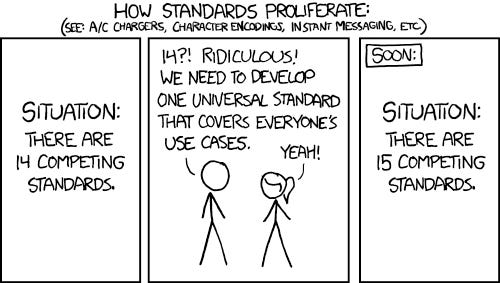
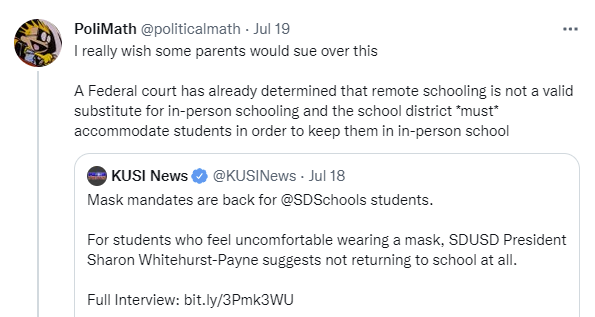
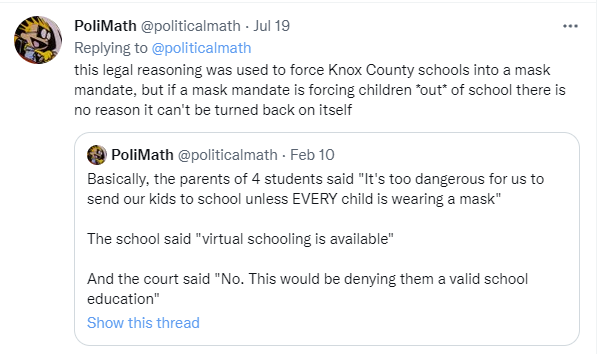




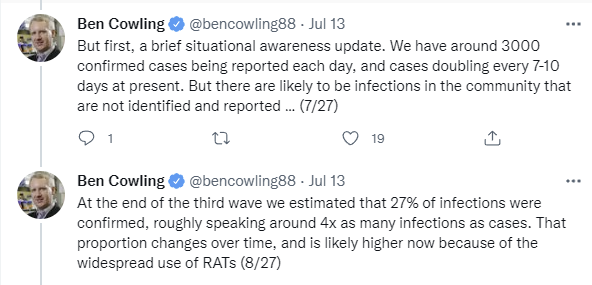

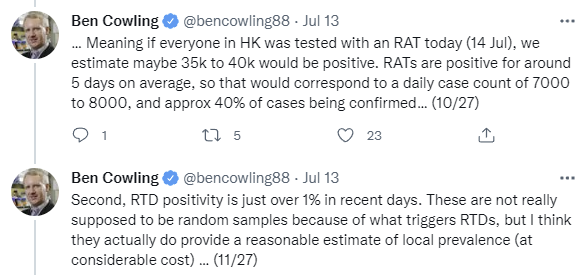
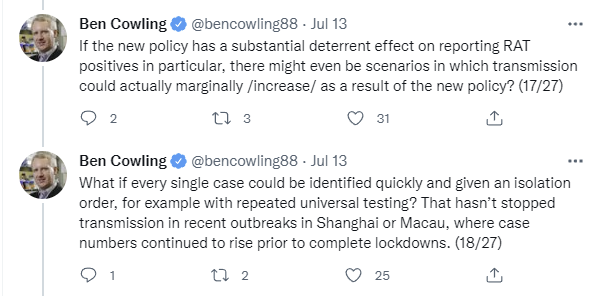
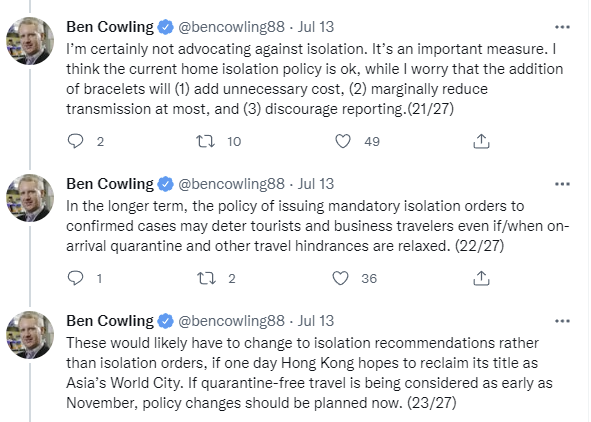
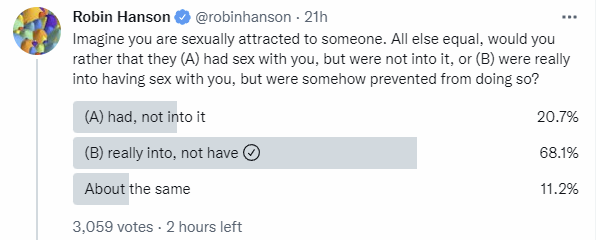
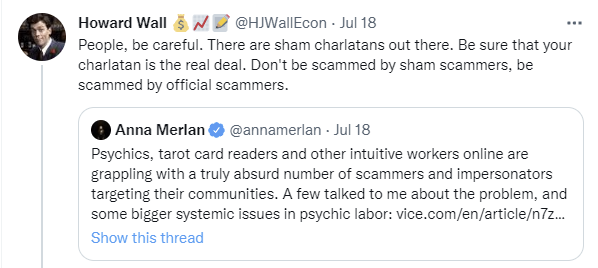
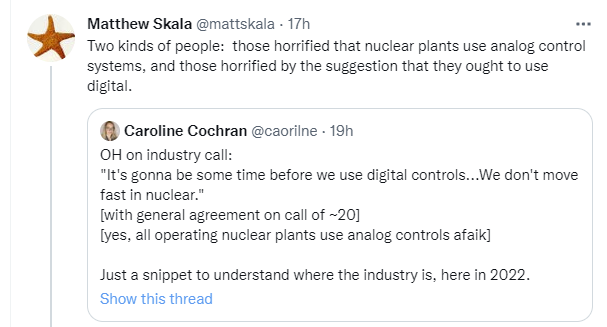

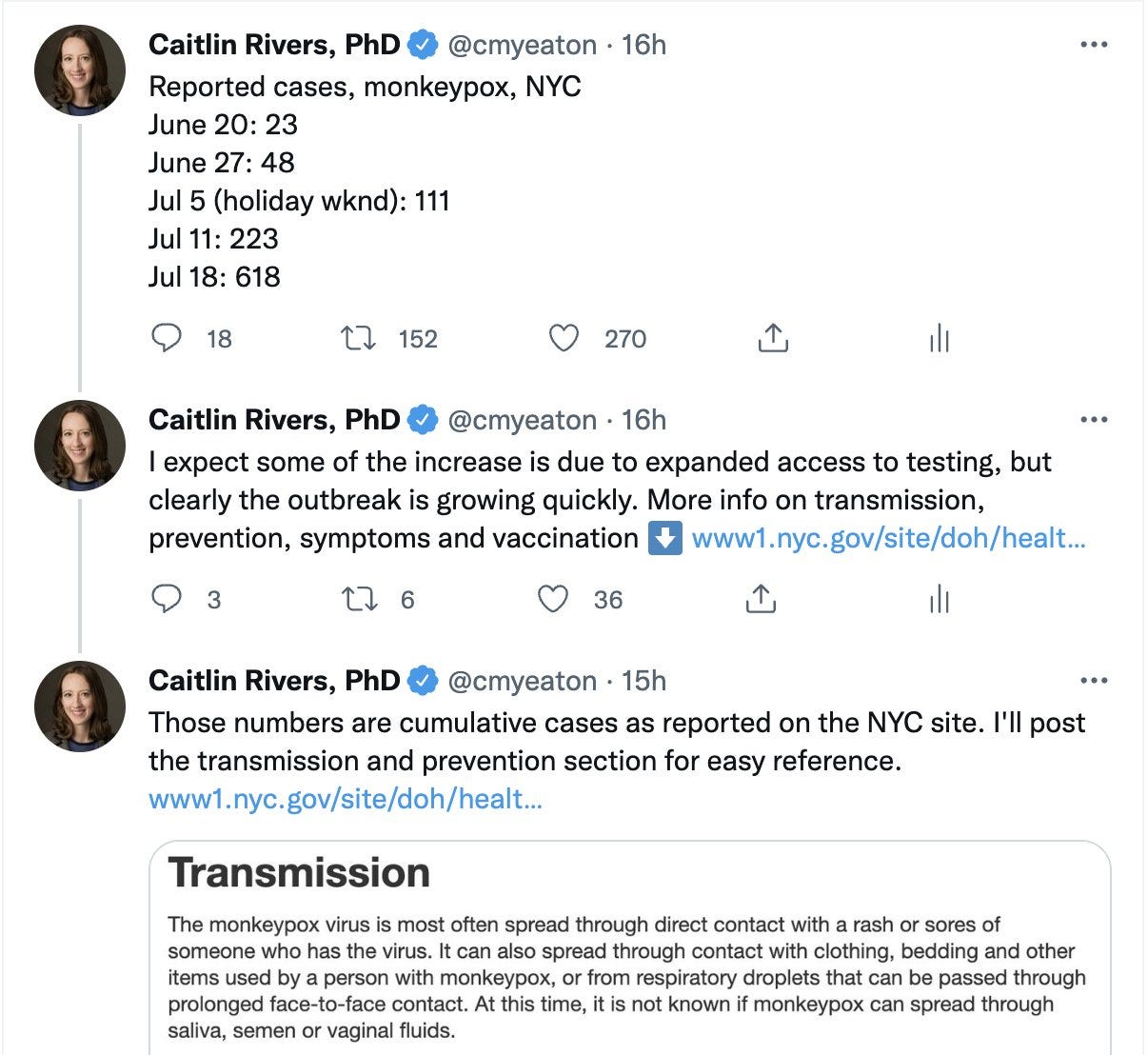
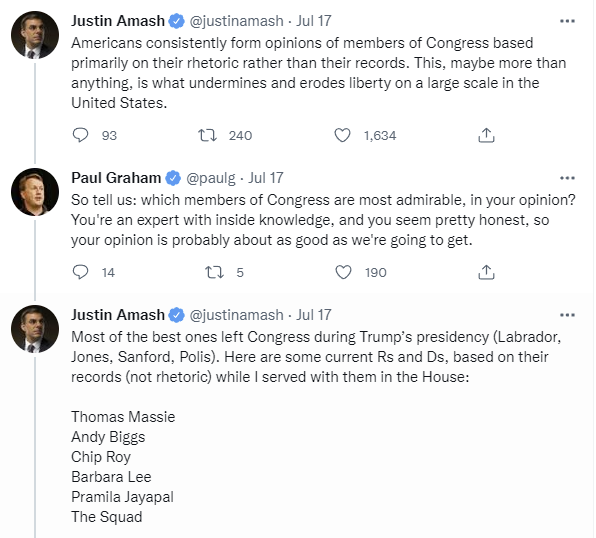
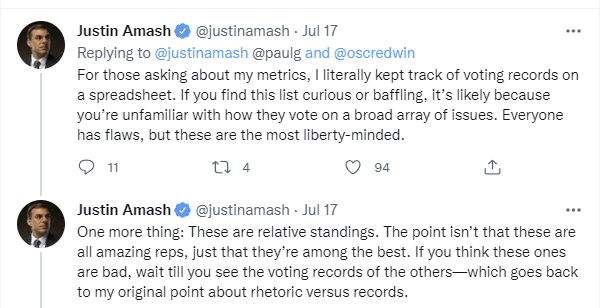
On school craziness part N: Homeschooling is easy (though ease varies by state), better, and very legal in the US. The more extra cash you have the easier it is, but it doesn't need to be more expensive than childcare over the same time.
If you're smart, and you have smart kids, this gives them a ridiculously accelerated education on around 2 to 3 hours school per weekday. Then once they're teens you can send them to college, where they get "socialization" with the peer group they'll have for life, not the crazy mix of folks in school.
I'm homeschooling 6 kids, and the eldest is 18 and graduating college this year. It's really been great for them, and for me.
Sharing my Paxlovid experience. Still somewhat feverish, sorry in advance if any of this doesn't make sense.
On Tuesday I woke up a bit phlegmy, but that's not super unusual for me. In the afternoon I took a sudden turn. Achey, coughing, and with a fever that climbed from 99 to 102 over about an hour. At-home rapid test gave me a very faint line, which still means positive.
I'm overweight and have had a near constant idiopathic headache the past two years, though I'm a spry 37 years old. I hoped that being overweight and having neurological problems would help me to get Paxlovid.
I called Bartell Drugs, a chain local to Washington, to ask if they have Paxlovid. They did not.
I called Walgreens and found that they did have Paxlovid. I asked if the pharmacist could prescribe it directly to me and was told that they can't do tha, the prescription has to come from a doctort. I told them I'm looking at the FDA announcement from Jul 6 authorizing pharmacists to prescribe the drug, and they told me that it hasn't been approved by the state's pharmacy board.
Okay then, I'll go the doctor route. I called them up and while they weren't able to prescribe based on my self report of a positive test, I was able to get an appointment later that afternoon. They told me that at-home tests can yield a positive result for flu, which AFAICT is not true.
Still hoping to avoid leaving my bed, I did some more research online. I Googled for "washington state pharmacy board paxlovid" and in my fevered state thought the first result was from the Washington State Pharmacy Board. It reiterated that pharmacists can prescribe Paxlovid, but it wasn't the pharmacy board. It was the Washington State Hospital Association: https://www.wsha.org/articles/covid-19-therapeutics-reminders-paxlovid-evusheld/. I realized I hadn't located the pharmacy board when I called Walgreens back to report my findings and they asked what site I was looking at and the domain was wsha.org. At this point I gave up on the pharmacist prescribed option.
As far as I can tell now, the "Washington State Pharmacy Board" does not exist. There's a Washington State Pharmacy Association which looks like a trade organization. Then there's a bunch of spammy sites that purport to share addresses and phone numbers for the Washington State Pharmacy Boad. But no website for the supposed entity itself.
On to the doctor. Taking a car ride at this time was not great, I'm lucky my wife was able to drive me. I had a 102° F fever, it was 85° F outside, I was bundled in a full sweatsuit, and still getting chills. They had me wait in my car, and luckily the wait was not long. An ARNP came out to gather the test sample and send me on my way. Twenty minutes later I got a call back telling me that I'm confirmed positive and that she'll send over the Paxlovid script. An hour or so later my wife picked up the drugs without any problems.